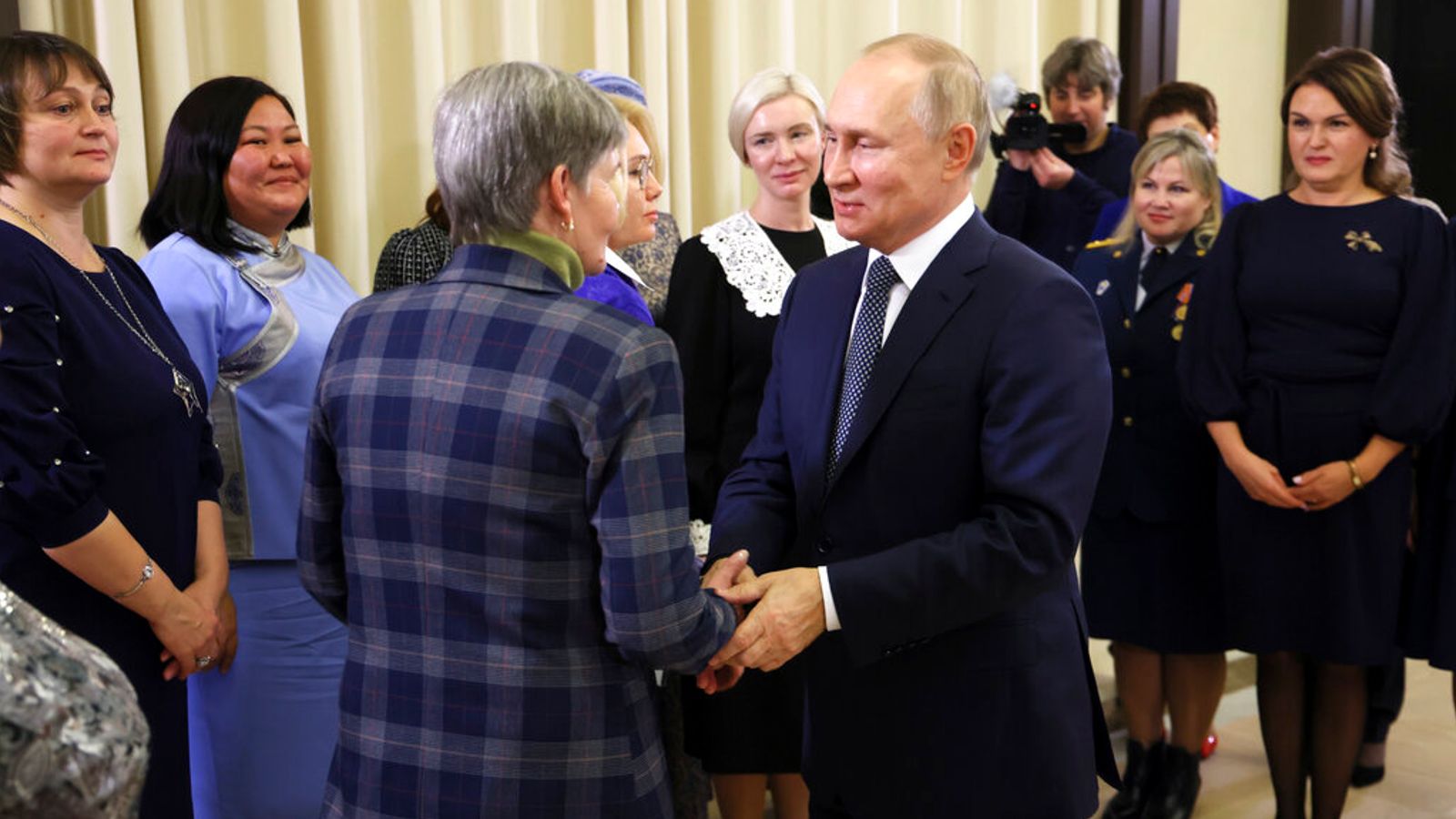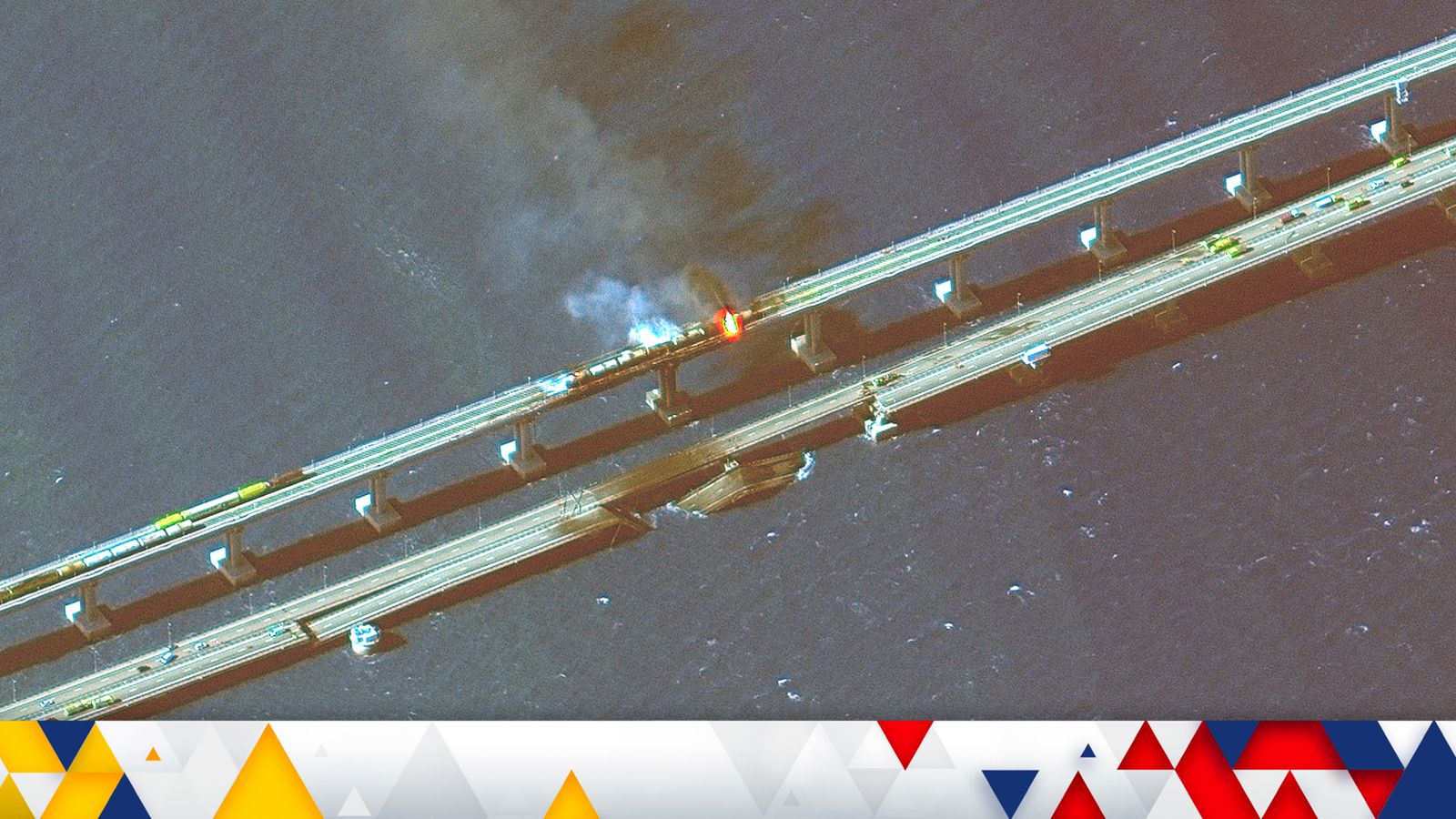Vladimir Putin looks ‘pained’ as he has tea with mothers of Russian soldiers killed in Ukraine war

Vladimir Putin has met with the mothers of Russian servicemen for a cosy cup of tea and a lengthy, televised exchange of views.
Contrary to his long-table treatment of Russian officials, the Russian president sat up close and personal among the women at his Novo-Ogaryovo residence just outside Moscow, telling them he shared the pain of those who have lost sons and would do everything he could to provide families with help and support.
He also advised them not to trust everything they see on the internet. The women were frank and emotional. He looked pained and sincere.
Ukraine war latest: Amount Moscow has spent on invasion revealed
Please use Chrome browser for a more accessible video player
1:10
Putin reveals he calls soldiers in Ukraine
He needs to do this. Since mobilisation, social media has been awash with videos from mobilised men or “mobiks” complaining of a lack of basic equipment, weaponry or training, the general gist being that they are being sent to the front like cannon fodder.
At the same time, mothers and wives across the country have filmed themselves petitioning the president to deal with the multitude of problems and to make sure their men are better provided for.
The Kremlin knows that the best way to head off this viral spread of complaints is to embrace it, glorify the role of the mother and say the president is listening.
At an event in Moscow on Tuesday entitled “Heart of Soldier’s Mother”, a succession of speakers told an audience of mostly young cadets and officers in training how sacred the mother is to the motherland.
Women whose husbands and sons are serving on the frontlines were handed awards and carnations. A man read out a long poem about how other countries would regret rousing the Russian bear.
Advertisement
Singers and ballroom dancers from the army’s cultural wing provided a rousing finale, quite the contrast from one of the opening remarks: “The army is not a holiday camp.”
I ask Tatyana Umarova, whose husband and son are both at the front, what she thinks the motherland is doing in Ukraine.
“If you live in a house and your neighbour’s flat is a mess – it has cockroaches, drunk guests come over and you have kids – you can’t live calmly,” she says.
“You can imagine that one day you come home from work later and your kids will be there with the drunk neighbours, that at some point the cockroaches will spread to your apartment. You live expecting threats.”
But she sympathises with Ukrainian mothers: “A son for a mother is the same son, no matter if they are Russian or Ukrainian. I think that, whether I’m right or not, we are all part of a big nation. The only thing I want is to wish their sons return home alive and well.”
The Kremlin won’t promise that and it remains to be seen whether today’s event serves to improve conditions for Russian servicemen at the front or whether it is an empty PR gesture.
One group of women disappointed not to have been invited call themselves the “All-Russian Council of Mothers”.
They arrived in Moscow last weekend from various parts of the country in a bid to arrange meetings with officials from the Ministry of Defence, the Russian parliament and the Kremlin with marginal success.
Instead, they have been followed constantly by unknown people who slunk off, hoods up, when the women challenged them.
“The authorities don’t want to listen to us and they are showing this any way they can,” says Olga Tuskanova, who has become the face of the group on social media this past week.
Their demands range from improving conditions for the mobilised to getting rid of nuclear weapons and persuading the president to sue for peace.
The group also hold some deeply questionable, conspiratorial world views on a supposed cabal of powerful people outside the Kremlin who they believe orchestrated the conflict. It is perhaps no surprise that the authorities are treating them with caution.
Click to subscribe to the Sky News Daily wherever you get your podcasts
By contrast, the Committee of Soldier’s Mothers has few illusions about what Russia’s mothers can and can’t achieve. The organisation has been going since the war in Afghanistan, led since the beginning by Valentina Melnikova.
She has negotiated on mothers’ behalf with the authorities for decades, trying to get news of the missing, bodies returned, assistance to those who need it.
I ask her about the hope voiced by many in the West that Russian mothers might convince the Kremlin to change course.
“We couldn’t do anything in 1999 when Mr Putin was appointed prime minister and he started the second Chechen war,’ she replies.
“Anyone who has any illusions about the possibility of influencing the Russian leadership now, from inside the country, they are all deeply mistaken.”

